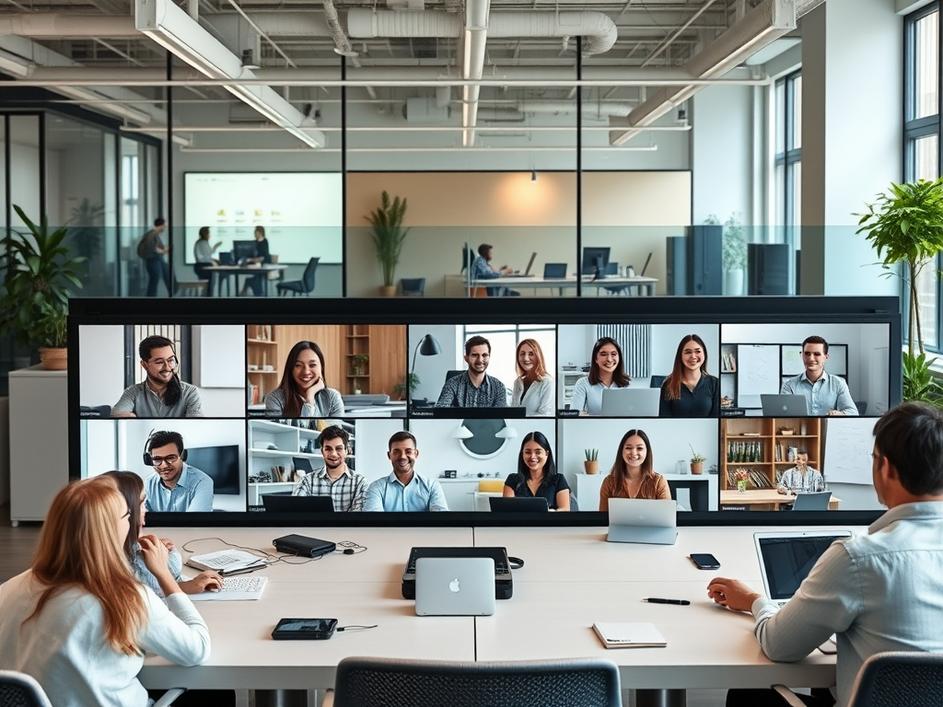


We are a digital agency helping businesses develop immersive, engaging, and user-focused web, app, and software solutions.
2310 Mira Vista Ave
Montrose, CA 91020
2500+ reviews based on client feedback

What's Included?
ToggleRetail has always been a fast-moving business. What worked yesterday might not work today, and what works today definitely won’t be enough for tomorrow. For a long time, stores focused on things like product displays, sales tactics, and making sure shelves were stocked. But now, with online shopping making things tougher, physical stores need to offer something more. They need to be places where people want to spend time, where shopping feels easy, and where staff really know their stuff. This means stores have to get smarter about how they operate, and that’s where new technology comes in. When a company like YOOBIC announces big updates to its platform, it’s not just a small tech upgrade; it’s a sign of how deeply AI is becoming part of how stores run every single day, trying to make things better for both customers and the people working there.
So, what does it really mean to use artificial intelligence in a retail store? It’s not about robots replacing people, not yet anyway. Instead, it’s about giving store managers and their teams powerful tools to do their jobs better and faster. Imagine a system that can quickly tell a manager which shelves need restocking based on real-time sales, or one that flags if a new promotional display isn’t set up quite right, showing a picture of how it should look. It could even help figure out the best staff schedules by looking at customer traffic patterns. These kinds of smart systems take away a lot of the guesswork and manual checks that used to eat up so much time. When a platform like YOOBIC’s gets a major upgrade, it points to these kinds of efficiencies growing even stronger. It helps stores move from just reacting to problems to actually anticipating them, making operations smoother and less stressful for everyone involved. This is about making the most of every moment inside the store, ensuring everything is running as it should.
Often, when we talk about technology, we focus on the big-picture benefits for the company. But it’s just as important to think about the people working on the front lines. These are the store associates, the managers, the people who actually interact with customers day in and day out. Their jobs can be hard, filled with many different tasks and often little time to get them all done. AI tools in retail aren’t just for making processes efficient; they’re also there to support these staff members directly. Think about easy-to-use apps that give quick training modules, or clear checklists for opening and closing procedures. Imagine a system that lets a sales associate instantly check stock across multiple locations for a customer, without having to call around. When staff feel supported by good tools, they’re less stressed, more confident, and can focus more on providing a great experience for shoppers. This boost in confidence and capability can make a huge difference in how customers feel about their visit to a store, turning a quick stop into a memorable experience.
From my point of view, the biggest takeaway from these kinds of platform updates is that they show a commitment to improving the entire retail ecosystem. It’s not simply about adding a fancy new software feature. It’s about recognizing that modern retail demands a smarter approach, one that values both efficiency and human connection. When AI handles the repetitive, data-heavy tasks, it frees up store employees to do what machines can’t: offer genuine smiles, give personalized advice, and build relationships with customers. This isn’t about replacing people with technology; it’s about using technology to make people even better at their jobs. A well-informed, less-stressed sales associate who has quick access to information and clear guidance is a huge asset. They can spend more time engaging with customers, solving unique problems, and making each shopping trip feel special. This kind of thoughtful technology integration changes the shopping experience from a transaction to an interaction, which is what truly sets great stores apart today.
The Fall 2025 Release from YOOBIC, and similar moves by other companies, really shows us where retail is headed. It’s a path toward stores that are incredibly well-organized, responsive, and ultimately, more enjoyable places to be. We’re moving beyond just having an online store and a physical store as separate things. Instead, these technologies help blend everything together, making sure that what happens online informs what happens in the store, and vice versa. It’s a continuous loop of learning and improving. The stores of tomorrow will likely be even more intuitive, with staff who are always a step ahead, ready to help because they have the right information at their fingertips. This means less friction for customers, fewer missed opportunities for businesses, and a more sustainable way for brick-and-mortar retail to thrive alongside its digital cousins. It’s an exciting time to watch how these smart tools continue to shape how we shop and how our favorite stores operate.
In conclusion, the latest advancements in AI for retail, like those seen in YOOBIC’s platform, mark a significant step forward. They highlight a clear trend: technology isn’t just for automating tasks; it’s for empowering people. By giving store teams better tools to manage everything from daily operations to customer interactions, these platforms help create environments where efficiency meets excellent service. The goal is to build a stronger, more adaptable retail future, one where every store associate feels supported, every customer feels valued, and every shopping trip is a positive experience. It’s about leveraging intelligence to bring out the best in human effort, ensuring that physical stores remain vital and vibrant parts of our communities for years to come.



Comments are closed